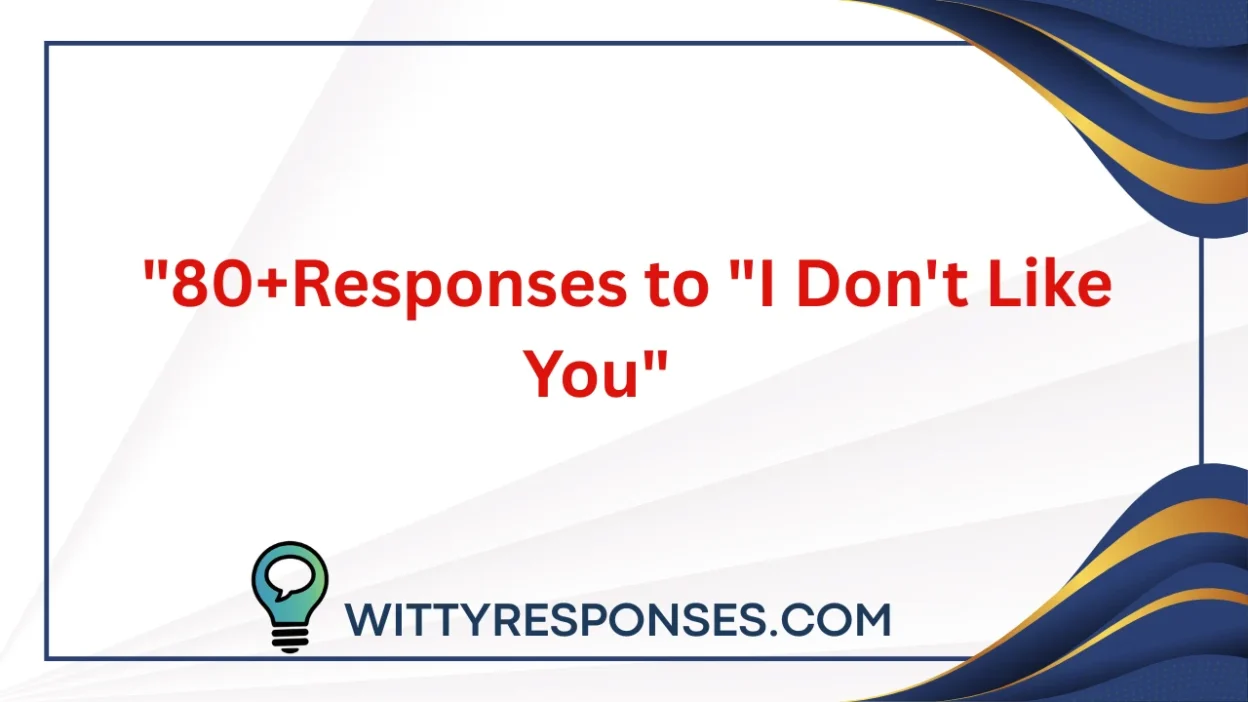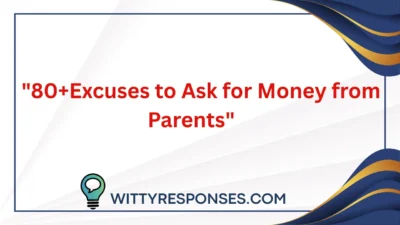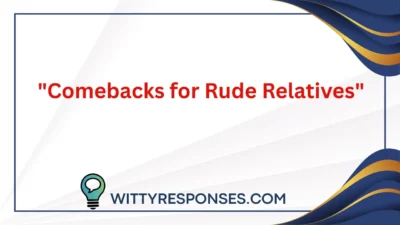Hearing someone say “I don’t like you” can sting, but how you respond can determine the tone and outcome of the situation. Whether the comment comes from a close friend, an acquaintance, or even someone you barely know, it’s essential to stay calm, composed, and thoughtful in your response. Below are various ways to handle this statement based on the context, ranging from humorous to assertive and understanding responses.
Calm and Composed Responses
If you want to stay respectful and keep things neutral without escalating the situation, these responses are perfect:
- “I’m sorry you feel that way.”
- “I respect your honesty.”
- “That’s unfortunate, but I understand.”
- “I’m not sure what I did, but I’ll respect your feelings.”
- “I’m sorry you feel that way, but I hope we can still keep things civil.”
- “I don’t think we’re going to see eye to eye, but I respect your opinion.”
- “It’s okay, not everyone will like me, and that’s alright.”
- “I appreciate you sharing that with me.”
- “Thank you for being upfront, I can respect that.”
- “I understand, and I’m sorry if I’ve upset you.”
Humorous Responses
If the situation allows for some light-heartedness and you feel comfortable joking around, these humorous responses might break the tension:
- “Well, that’s one way to keep things interesting!”
- “That’s fair, I’m not for everyone.”
- “Guess I’ll try harder next time!”
- “Not everyone has great taste, I get it!”
- “Ah well, can’t win them all!”
- “I’m not offended, but I do hope you change your mind!”
- “I didn’t think we were best friends yet, but that’s okay.”
- “Thanks for the honesty, I’ll work on my charm!”
- “I’m sure I’m not the only one, don’t worry.”
- “That’s a tough crowd, but I’ll survive!”
Assertive Responses
Sometimes, it’s important to assert your feelings while still maintaining respect for theirs. Here’s how you can stand your ground:
- “I’m not here to be liked by everyone, but I expect respect.”
- “I get that you don’t like me, but I’d still prefer to keep things respectful.”
- “That’s your opinion, and I respect it. I’m still going to be myself.”
- “I don’t think I did anything to deserve that, but I’ll respect your feelings.”
- “I understand you don’t like me, but I’m still going to be professional.”
- “That’s your choice, but I’m not going to change who I am.”
- “You don’t have to like me, but I believe in mutual respect.”
- “I’m sorry you feel that way, but I’m not going to let that affect me.”
- “I didn’t expect to be liked by everyone, but I still try to be kind.”
- “That’s okay. I don’t need everyone to like me.”
Curious or Understanding Responses
If you want to dig deeper and understand their reasons for saying they don’t like you, these responses can help:
- “I’d like to understand why you feel that way.”
- “I didn’t know I had done anything to upset you, can we talk about it?”
- I’m curious to know what makes you feel this way.”
- “I respect your opinion, but can you share why you feel that way?”
- “I’m open to feedback. Can you explain why?”
- “Is there something specific that I did to make you feel that way?”
- “I didn’t realize I did anything wrong. Can we talk it out?”
- “I’d like to understand if there’s anything I can improve.”
- “I hear you, but can you explain what’s bothering you?”
- “I’m not sure what’s going on, but I’d like to hear your thoughts.”
Deflecting or Neutral Responses
If you want to move past the comment without dwelling on it, these neutral responses can shift the conversation:
- “That’s your opinion. Let’s move on.”
- “I understand, let’s just leave it at that.”
- “Alright, we don’t need to discuss it further.”
- “I see, let’s not focus on that though.”
- “Okay, let’s change the topic.”
- “Understood. I’m not going to let that bother me.”
- “That’s fair. Let’s continue with the conversation.”
- “Alright, we don’t need to get into it.”
- “I get it. Let’s talk about something else.”
- “Alright, noted. Let’s move on.”
Reflective Responses
If you want to acknowledge your own role and show growth or understanding, these reflective responses could be effective:
- I can see how I might have come across that way.”
- “I understand if my actions gave you that impression, and I’m sorry.”
- “Maybe I’ve made mistakes that led to this. I’ll work on it.”
- “I respect your feelings, and I’ll take some time to reflect on this.”
- “If I’ve done something to upset you, I’d love to know so I can improve.”
- “I can see why you feel that way. I’ll make sure to be more mindful moving forward.”
- “I can respect that. If there’s anything I did to make you feel that way, I’ll take responsibility.
- “I’m sorry if I’ve given you a reason to feel that way. I’ll do better.”
- “If I’ve hurt you in some way, I’d like to make it right.”
- “I respect your honesty and will work on being more considerate.”
Tips for Responding to “I Don’t Like You”
- Don’t Take It Personally
It’s natural to feel hurt, but remember that everyone has their own reasons for feeling the way they do. Stay calm and don’t let it affect your self-worth. - Stay Calm and Collected
Responding with a level-headed approach will help defuse any tension and show maturity, no matter how the comment was delivered. - Use Humor if Appropriate
If the situation allows for it, a light-hearted or humorous response can diffuse any tension and help maintain a friendly atmosphere. - Consider the Context
If the person is a close friend or someone you care about, it might be worth probing deeper to understand why they feel that way. If they are a stranger or acquaintance, you may prefer a more neutral or indifferent response. - Set Boundaries
If the statement feels disrespectful or hurtful, it’s important to assert your boundaries in a way that respects both yourself and the other person.
Conclusion:
Being told “I don’t like you” can be difficult to hear, but it doesn’t have to define the situation. By staying calm, asserting yourself when necessary, or even injecting humor into the conversation, you can handle the remark with grace and maturity. Responding in a way that reflects your true self will help you navigate the interaction without letting it negatively affect you.
Have you ever been told “I don’t like you”? How did you respond? Let us know in the comments!



